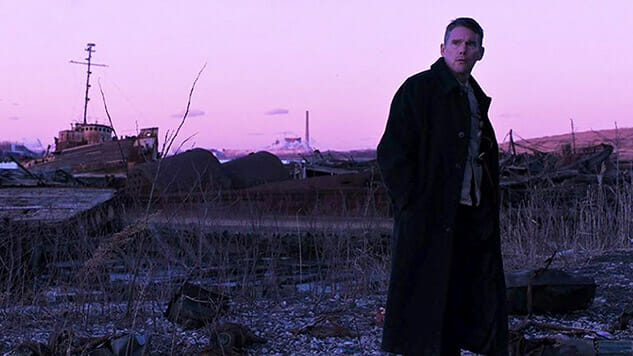First Reformed

What makes a man start fires? What if that person were a man of God? Paul Schrader, now 71, has perhaps spent his entire career as a filmmaker attempting to ask that question, to breach the impenetrable truth of whatever that question’s answer could be, beginning with Blue Collar, a story of auto workers and union members in Detroit compromising their values to survive in the shadow of forces too large and too immovable to compromise themselves. With First Reformed, Schrader’s 20th feature as director, that question absorbs the whole film—not through cries of nihilism, as in his previous, garbage Dog Eat Dog, but as a sustained act of faith: What must the devout do for a world God has abandoned?
The question lingers wetly in Ethan Hawke’s eyes as he carries every frame of Schrader’s film. Playing Father Ernst Toller—a minister who in a former life had a wife and a son and a military career, an end brought to all three by that son’s death in Iraq—Hawke has spent the past 20 or so years sublimating the radical tendencies of his iconic slackerdom into a fiercely simmering anxiety, as if the purposelessness of his past malaise has left him stewing on how little he can or could do to change anything in this world. Who better to be a minister ineffectually shepherding a tiny, practically non-existent congregation than Hawke, a symbol of outrage gone to pasture?
Toller serves the titular First Reformed, a historic landmark in upstate New York attended by a scant congregation, surviving through gift shop sales and the patronage of Abundant Life Ministries, the megachurch conglomerate down the road led by Pastor Jeffers (Cedric the Entertainer, beautifully convincing, a kind-hearted con-man who knows what kind of money he’s into). Concerned but busy, Jeffers makes time for and listens to Toller regarding the small historic property’s exigencies, but Jeffers has bigger whales to harpoon, especially when it comes to keeping First Reformed open. In this case, that means the church is celebrating a big anniversary, and the corporate sponsors, manifest in Epic Capitalist Douche Edward Balq (Michael Gaston), must be appeased.
Meanwhile, Mary (Amanda Seyfried), a pregnant First Reformed parishioner, approaches Toller about counseling her husband Michael (Philip Ettinger), who Mary believes is, to put it lightly, losing his faith. In one of Schrader’s many tightly scripted scenes, Toller attempts to alleviate Michael’s burden, listening to the young soon-to-be-father lament bringing a new child into such a damaged, doomed world. An environmental activist possessed of fierce vision, Michael debates the responsibility of pressuring the Earth with new life, while Toller impresses Michael with the responsibility of fostering new life to take care of the same Earth.
-

-

-

-

-

-

-

-

-

-

-

-

-

-

-

-

-

-

-

-

-

-

-

-

-

-

-

-

-

-

-

-

-

-

-

-

-

-

-

-








































